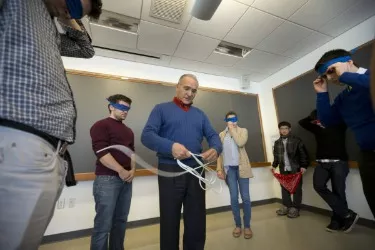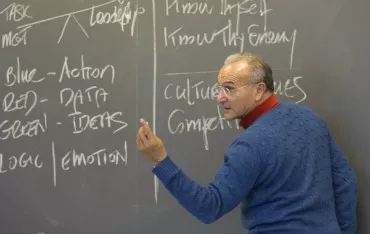Seminar Unmasks the Personal Power of Students
On a recent Friday afternoon in the Science Center, Shalom Saada Saar '74, a leadership and management professor at the MIT Center for Transportation & Logistics and visiting professor at the China Europe International Business School, hands a length of rope to three groups of students and gives them a challenge: After 20 minutes of strategizing, each group must lay the rope on the floor in a perfect square. Everyone will be blindfolded. Everyone must touch the rope, and everyone must release at the same time. Each group is expected to complete the task in one minute or less, but quality is preferable over speed.

Shalom Saada Saar '74 prepares his class for a group exercise designed to emphasize an understanding of self-awareness and group dynamics.
Hands shoot up across the classroom, but Saar gently dismisses the questions with a simple edict: "Those are the rules. The rest is up to you."
The groups quickly get to work while Saar observes from the sidelines. How each group will perform depends largely on their personality types and how those types interact, he says. Some will spend too much time brainstorming and not enough on execution. For others, it will be the opposite. It's all part of a learning process under the banner of Know Thyself, a non-credit spring seminar offered under the auspices of the Center for Innovation and Leadership and designed to encourage students to understand and examine their personal strengths and weaknesses, learn how to balance analysis with insight and data with innovation, and enhance their skills when working with others.
"The very nature and culture of Swarthmore is its capacity to attract unusual individuals who want to change the world and make a difference in the lives of others. Yet, the search for the right cause and the right place is not an easy journey," Saar says. "This seminar helps participants to look at themselves through different mirrors. Thus, enhancing their knowledge of themselves and discovering their strengths as well as their weaknesses. For instance, for collaborative individuals, their search becomes clearer in narrowing their options for the type of engagement they will benefit from the most. They learn to engage the minds and touch the hearts of others by casting a wider net. As a result, they become less self-centered and more able to see themselves as an integral part of the world they want to see."
When the time comes for ropes to be laid, each group takes astonishingly different approaches. One uses verbal cues. Another utilizes the corner of the room. The third team takes direction from a de facto leader.
According to Mayra Tenorio '15, the interactive simulations allow students to confront their weaknesses and appreciate their strengths.
"The exercises end up exposing how your mind works, how your insecurities seep out, and how your talents either hinder you enable you to succeed," she says. "The greatest lessons I've learned is that if you aren't stretching, you're shrinking. By knowing yourself, you can use the talents you have to help you acquire those that need more work, but it's important to go outside of your comfort zone and really challenge yourself." Tenorio has learned that she has a tendency to control every aspect of a project, but "to be an effective leader, I need to believe in my team."
Unlike the top-down model of the 1980s, team leadership has now become a vital approach for successful business and organizations, according to Saar, author of Leading with Conviction: Mastering the Nine Critical Pillars of Integrated Leadership (2013). "Today's organizations and their leaders are becoming more aware that people are the most important asset [and] that growth, globalization, and expansion are highly associated with a creative workforce and innovative culture," he says. "Managers are encouraged to become less commanding and more facilitating. In sum, organizations today are becoming more open, more interactive, less isolated, more creative, and searching for cultures and values that unleash the human potential."
For Ascanio Guarini '16, the seminar has been a truly unique experience. "It has allowed me to learn about how I think and make decisions," he says. "Through a series of discussions, interactive activities, and data-driven personality tests, I've been able to get multiple perspectives on my thought processes-and the correlations between results are pretty staggering. It's given me a perspective I can't learn in conventional lecture."
For Saar, interaction and simulation are critical to the learning process, particularly when it comes to self-discovery and leadership; he says true learning occurs through interaction, not observation. After each exercise, the students discuss how they either contributed to success or hindered a potentially better result.
As a student at Swarthmore, Saar says he was challenged to change his own perspective on things and think in critical ways, which is what makes Swarthmore a logical setting for Know Thyself. "Swarthmore assisted me in taking the time to reflect and learn from my peers as well as from very supportive faculty," says Saar, who majored in economics and psychology. His education helped cultivate a personal motivation that began during his childhood.
"My desire and motivation to lead originated from my early days growing up in Israel," he says. "Knowing oneself is a prerequisite for impactful leadership. Lack of self knowledge can place individuals in risky situations. Self-knowledge is an umbrella covering things like interpersonal skills, emotional intelligence, dealing with crisis, managing conflicts, inspiring others, managing change, and other critical skills. Yet, none of these skills are grounded without the opportunity of a person to be aquainted with him or herself."

"Knowing oneself isn't easy," Saar admits. "We are very good at self-denial. Yet the rewards of becoming more confident and able to deal with unpredicted situations are powerful. It requires us to be vulnerable, a quality that is not highly valued in Western culture."
For Sungwon Ma '16, the introspection and group dynamics have provided lasting insight. She initially enrolled on a whim, but admits she was hooked from day one. "Like all of us, I have been trying to answer some enduring questions," she says. "What kind of person am I? In what do I excel? Could I be a leader? And as inundated with possibilities as I am, what are some career paths that would be 'right' for me? Shalom has helped me answer these questions."
Those questions are what Saar hopes students, as future leaders, will seek to answer. "Knowing oneself isn't easy," he admits. "We are very good at self-denial. We are very good at avoiding things that cause us discomfort. Yet the rewards of becoming more confident and able to deal with unpredicted situations are powerful. It requires us to be vulnerable, a quality that is not highly valued in Western culture."
For too long, Saar says, organizations considered "soft skills" — such as patience, listening, influencing, probing, facilitating, and expressing empathy and compassion — as weaknesses. "We know now that most successful individuals are those that have a higher EQ than IQ."



